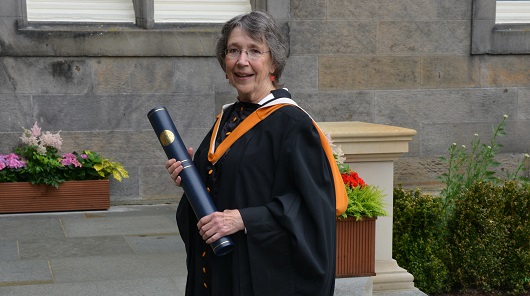Laureation address: Professor Jean Lave

Laureation by Professor Nigel Rapport FRSE
School of Philosophical, Anthropological and Film Studies
Chancellor, I have the honour to present for the degree of Doctor of Letters, honoris causa, Professor Jean Lave.
Anthropology is the study of what it is to be human: an exploration of our universal human capacities as a species. And anthropology is the study of what we make of our humanity: how as individual human beings and as groups of individuals we put those capacities into practice. Anthropologists study how we live our human lives.
Here is an ambitious and even all-encompassing discipline, then. For this reason anthropology is normally to be found in universities as an adjectivised version of itself. Practitioners divide themselves up as ‘social’ or ‘cultural’ or ‘biological’ anthropologists, for instance; also as ‘psychological’, ‘cognitive’ and ‘economic’ anthropologists; and also as ‘Structuralist’, ‘Marxian’, ‘existential’ and ‘cosmopolitan’ anthropologists.
The specialism that our honorary graduand this morning, Professor Jean Lave, has made her own is learning: how precisely do human beings learn from one another — to the extent that they do and can? Professor Lave’s answer has challenged conventional theories in social science and in educational psychology, pioneering a theory of what she called ‘situated learning, in communities of practice’.
In Virginia Woolf’s evocative phrasing, we human beings are conscious within ‘moments of being’. What we know, and how we know, and how we act and what we make depends on the situation: the moment of our engagement with the world and with others, on our particular apprenticeship to conventions of practice. We must, Jean Lave also argues, re-conceive of learning and learners in terms of social practices in everyday life.
Professor Jean Lave completed her doctorate in Social Anthropology at Harvard University in 1968, having already gained a BA from Stanford. Since the late 1960s she has had an affiliation with the University of California, first at Irvine and then Berkeley. She has also been a Visiting Professor at Amherst, at Copenhagen and at Manchester University. Among her awards are the Spencer Foundation Senior Fellowship, the Sylvia Scribner Research Award of the American Educational Research Association, Lifetime Achievement Awards of the American Anthropological Association and an honorary degree from Aarhus University. Currently Jean Lave is Professor Emerita of Education and Geography at the University of California, Berkeley. She has published some 45 academic articles and also five key books:
- Cognition in Practice: Mind, Mathematics and Culture in Everyday Life (1988)
- Situated Learning: Legitimate Peripheral Participation (co-authored with Etienne Wenger, 1991)
- Understanding Practice: Perspectives on Activity and Context (co-edited with Seth Chaiklin, 1993)
- History in Person: Enduring Struggles, Contentious Practice, Intimate Identities (co-edited with Dorothy Holland, 2001)
- Apprenticeship in Critical Ethnographic Practice (2011)
Jean Lave’s model of situated learning suggests that learning is above all a social process: it must involve social interaction, and knowledge should be presented in an ‘authentic’ context. That is, what is being taught needs to be aligned with the pupil’s wider ‘community of practice’. People learn best, it is suggested, in a situation in which participants share a common identity and goals; and we learn in the middle of our lives, while doing other everyday things, alongside people with whom we identify. Knowledge acquisition is a social process in other words.
Moreover, people can learn at different levels of intensity depending on their position in the group. A young person or newcomer might begin on the edges of the group and gradually move to full participation as they learn from more experienced group members. Lave termed this ‘legitimate peripheral participation’. It led her to examine different kinds of apprenticeships: among tailors in Liberia, midwives in Mexico, meat-cutters in American supermarkets and even among recovering alcoholics in Alcoholics Anonymous. In all of these situations, apprentices in their communities achieved learning success without necessarily being instructed.
And if ‘just plain folk’ can learn in this way then what of teaching and learning in specific classroom environments? Might not these findings be generalised? Certainly. How to teach mathematics? Bring it back to the ‘real world’ of everyday life: to the everyday activities and the social relations and communities in which people do their normal thinking: are we not all brilliant or at least adequate mathematicians in our mundane daily activities of grocery shopping for ‘best buys’ in the supermarket or dieting or scheduling our TV watching? All complex mental processes and complex practical activities can, according to Lave, be considered versions of the complex yet situated ways in which we conduct our everyday lives.
In short, Jean Lave’s insights have been recognised and applied widely: in educational, organisational and business environments. Situated learning has now even been shown to play an important role in online or e-learning, and in online course design. Finally, her ideas throw light on old and intractable issues of conflicts around the world: of learning to take sides in situations of long-term geophysical conflict, from class war to domestic abuse, even to structural disputes within large-scale and complex organisations such as multinational corporations or universities. All these entail apprenticeships in learning how to obfuscate and obstruct and hate. And to have insight into how conflict is learned also affords us opportunity to hazard how it might be unlearnt, and new identities forged.
Chancellor, for her influential and illustrious work as an anthropologist I ask you to confer upon Professor Jean Lave, the degree of Doctor of Letters, honoris causa.
Category Awards